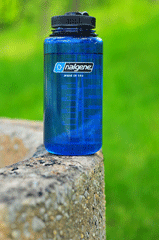War of the Sciences
Air Date: Week of September 19, 2008

Some manufacturers of polycarbonate water bottles made with bisphenol-A have begun phasing out the compound, which has been associated with cardiovascular disease and diabetes in humans. (Photo: Tom Clark)
Even as numerous studies link bisphenol A to health risks in humans, the Food and Drug Administration maintains that the chemical is safe. As Living on Earth’s Ashley Ahearn reports, this has led to intense controversy.
Transcript
GELLERMAN: The Food and Drug Administration doesn’t set limits on BPA, because the agency says there’s not enough scientific evidence that it’s harmful. But some scientists and consumer advocates strongly dispute that position and voiced their concerns at a recent FDA hearing. The intense controversy has ignited what’s being called “a war of the sciences.” Living on Earth’s Ashley Ahearn reports.
AHEARN: There’s a 93 percent chance that bisphenol A is in your body. Most of it gets there through what you eat and drink.
Dr. Laura Tarantino is one of the people who decide whether that’s a problem. She directs the office of Food Additive Safety at the Food and Drug Administration.
TARANTINO: From the totality of the evidence we have to come to kind of a yes/no decision and we believe thus far we don’t need to change the regulation at this time, that the levels to which people are exposed are safe.
AHEARN: At the recent hearing, several scientists and advocates questioned which studies FDA considered before it gave bisphenol A the “all clear.” Beth Jordan is medical director of the Association of Reproductive Health Professionals.
JORDAN: The FDA’s current draft assessment concludes that BPA is safe. This conclusion is based on two studies, both of which are funded by institutions that have a financial stake in the outcome of the FDA’s decision.
AHEARN: Tarantino says the FDA considered many non-industry studies before making its decision. But she said that even studies from respected peer reviewed journals weren’t adequate for FDA.
TARANTINO: Those are very useful, but they are not the same kinds of studies that were conducted specifically to look for feeding a compound in the diet, does it cause adverse effects? As far as I know no one has said give BPA to an animal for a lifetime and you see prostate cancer or breast cancer. None of those studies have happened.
AHEARN: That’s the FDA’s view. Now listen to Dr. Fred Vom Saal.
VOM SAAL: It causes breast cancer, prostate cancer, low sperm count in males. If you take every major human health trend, bisphenol A causes that in animals.
AHEARN: Vom Saal spoke at the FDA hearing. He’s a professor at the University of Missouri, Columbia and has published several studies on bisphenol A. He goes on:
VOM SAAL: It causes uterine fibroids and polycystic ovaries. It causes early puberty in females.
AHEARN: And on:
VOM SAAL: It causes brain damage that makes the brain of rats and monkeys look like the brain of a senile person.
AHEARN: And on…
VOM SAAL: and it also eliminates sex differences and leads to hyperactivity and learning disorders. It leads to obesity. So the array of harm that this chemical causes is absolutely stunning.
AHEARN: The way a chemical affects animals doesn’t necessarily predict the way it will affect humans. But bisphenol A acts like estrogen in the body and with a chemical that mimics a natural hormone, Vom Saal says even small doses can trigger big responses.

Some manufacturers of polycarbonate water bottles made with bisphenol-A have begun phasing out the compound, which has been associated with cardiovascular disease and diabetes in humans. (Photo: Tom Clark)
AHEARN: Though the FDA has so far opted not to regulate bisphenol A, at least ten states and Canada have moved to do so.
Some retailers and manufacturers, including Nalgene, the water bottle maker, are phasing out products containing the compound.
Consumer groups recommend avoiding canned food and number seven plastics.
For Living on Earth, I’m Ashley Ahearn.
Links
Living on Earth wants to hear from you!
Living on Earth
62 Calef Highway, Suite 212
Lee, NH 03861
Telephone: 617-287-4121
E-mail: comments@loe.org
Newsletter [Click here]
Donate to Living on Earth!
Living on Earth is an independent media program and relies entirely on contributions from listeners and institutions supporting public service. Please donate now to preserve an independent environmental voice.
NewsletterLiving on Earth offers a weekly delivery of the show's rundown to your mailbox. Sign up for our newsletter today!
 Sailors For The Sea: Be the change you want to sea.
Sailors For The Sea: Be the change you want to sea.
 The Grantham Foundation for the Protection of the Environment: Committed to protecting and improving the health of the global environment.
The Grantham Foundation for the Protection of the Environment: Committed to protecting and improving the health of the global environment.
 Contribute to Living on Earth and receive, as our gift to you, an archival print of one of Mark Seth Lender's extraordinary wildlife photographs. Follow the link to see Mark's current collection of photographs.
Contribute to Living on Earth and receive, as our gift to you, an archival print of one of Mark Seth Lender's extraordinary wildlife photographs. Follow the link to see Mark's current collection of photographs.
 Buy a signed copy of Mark Seth Lender's book Smeagull the Seagull & support Living on Earth
Buy a signed copy of Mark Seth Lender's book Smeagull the Seagull & support Living on Earth

